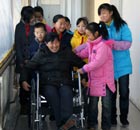Hot on the Web
Poll: Online users getting younger
By Cheng Yingqi (China Daily)
Updated: 2010-03-05 06:59
 |
Large Medium Small |
Chongqing: The average age of children using the Internet has been getting lower, and parents who force their children offline are increasing the risk of online addiction, a survey has shown.
The average age of children in Chongqing municipality who start accessing the Internet is 9.7 years, compared with 12 in 2004, a survey released on Tuesday by the Chongqing Education Science Research Institute showed.
"Instead, they should adopt a positive attitude to guide their children in using the Internet."
The survey polled 3,200 students aged 11 to 19 in 33 primary schools and middle schools in nine counties in Chongqing. While the average age of first-time netizens was 9.7, most 6-year-old children living in developed areas were able to use social networks, play online games and watch cartoons on the Net, the poll showed.
Ninety-five percent of those polled also said they were fond of surfing the Net. Among them, 71 percent watched movies, 59 percent chatted, 52 percent played games, 50 percent studied, 35 percent blogged, 14 percent used e-mail and 5 percent shopped.
It also found a correlation between child Internet addicts and the efforts of parents to prevent them from getting addicted: Students who were not allowed to surf the Net were three times more likely to become addicted than others.
"The harder the parents try to keep their children away from the Net, the harder they are pushing them toward Internet addiction," Wang said.
"As far as I'm concerned, parents should have faith in their children," Wang said. "Otherwise, the children will become rebellious."
There is currently no universal standard on Internet addiction, but the survey's researchers made every student take a test to determine whether they are Internet addicts. It showed that 2.5 percent of those studied were seriously addicted to the Internet, while another 2.9 percent were addicted.
Students are also reportedly more likely to be addicted to the Internet in cyber cafes than at home. Among the respondents, 13 percent of those who often go to cyber cafes were Internet addicts. In contrast, only 0.7 percent using the Internet at home became addicted to the Net.
In the survey, 3 percent of the students who were encouraged to access the Internet at home also said they go to cyber cafes frequently, while 10 percent of the students who were kept away from computers by their parents said they usually sneak to cyber cafes behind their parents' back.
To help fight the threat of online addiction among the young, governments at all levels cracked down on cyber cafes and announced plans to install filtering software on computers.
Still, Wang Weihong said his research showed that effective family guidance on the perils of the Net was far better than simply shutting down cyber cafes.











